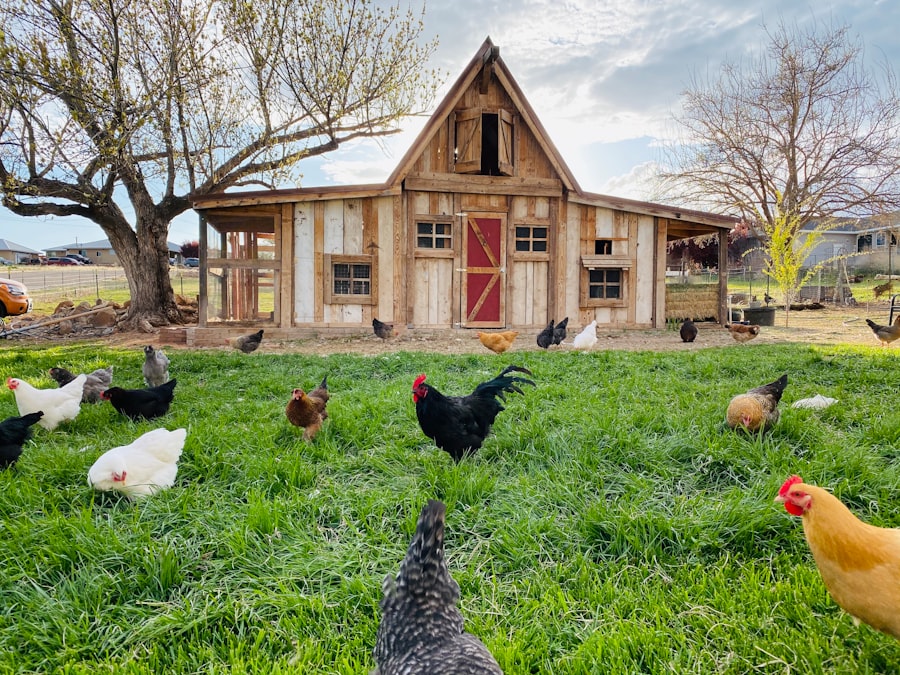Keeping chickens out of your yard is essential for maintaining a clean and enjoyable outdoor space. While chickens can be charming and provide fresh eggs, they can also cause damage to gardens and lawns. Chickens have a natural instinct to scratch and peck at the ground, which can lead to uprooted plants and destroyed flower beds. Additionally, chickens can leave droppings that not only create an unsightly mess but can also attract pests such as flies and rodents. By taking steps to keep chickens out of your yard, you can ensure that your outdoor space remains beautiful and pest-free.
Key Takeaways
- Keeping chickens out of your yard is important to maintain a clean and safe environment.
- Building a chicken coop requires careful planning and consideration of the chickens’ needs.
- Choosing the best location for your chicken coop is crucial for the chickens’ health and safety.
- Fencing options such as electric fences and chicken wire can effectively keep chickens out of your yard.
- Natural deterrents like planting certain plants and using motion-activated devices can also help keep chickens away.
Building a Chicken Coop: Tips and Tricks
One of the most effective ways to keep chickens out of your yard is by providing them with a secure and well-built chicken coop. A sturdy coop will keep chickens contained and prevent them from wandering into your yard. When building a chicken coop, it is important to consider factors such as size, ventilation, and security. The coop should be large enough to comfortably accommodate the number of chickens you plan to keep, with ample space for roosting and nesting. Proper ventilation is crucial to prevent the buildup of moisture and odors inside the coop. Additionally, the coop should be secure, with strong locks and predator-proof fencing to keep out unwanted visitors.
When it comes to choosing materials for your chicken coop, there are several options to consider. Wood is a popular choice due to its durability and natural aesthetic appeal. However, it is important to use treated or rot-resistant wood to ensure that the coop lasts for many years. Metal is another option, as it is durable and easy to clean. However, metal coops may require insulation in colder climates to protect the chickens from extreme temperatures. Finally, there are also plastic coops available on the market, which are lightweight and easy to clean but may not be as durable as wood or metal.
Chicken Coop Placement: Choosing the Best Location
Choosing the right location for your chicken coop is crucial for both the well-being of the chickens and the enjoyment of your yard. When selecting a spot for your coop, there are several factors to consider. First and foremost, you must ensure that your coop is in compliance with local regulations. Some areas have specific zoning laws or restrictions on keeping chickens, so it is important to check with your local government before building a coop. Additionally, you should consider the proximity of your coop to your neighbors’ properties. It is important to be respectful of their space and ensure that the coop does not create any disturbances or odors that may bother them.
Keeping your coop clean and odor-free is essential for maintaining a chicken-free yard. Regularly cleaning out the coop and disposing of waste properly will help prevent odors from attracting chickens to your yard. Additionally, you can use natural odor absorbers such as baking soda or wood shavings to keep the coop smelling fresh. Proper ventilation in the coop will also help prevent the buildup of odors. Finally, consider planting fragrant herbs or flowers near the coop to mask any potential odors.
Fencing Options for Your Yard: What Works Best?
Installing a fence around your yard is an effective way to keep chickens out. There are several types of fencing options to consider, each with its own pros and cons. One popular option is chicken wire fencing, which is affordable and easy to install. However, chicken wire may not be strong enough to keep out determined chickens or predators. Another option is electric fencing, which delivers a mild shock to deter chickens from entering your yard. Electric fencing can be effective but may require regular maintenance and can be expensive to install.
If you are looking for a more aesthetically pleasing option, consider using decorative fencing such as picket or wrought iron fences. These types of fences can add charm to your yard while also keeping chickens out. However, it is important to ensure that the gaps between the fence posts are small enough to prevent chickens from squeezing through. Finally, if you have a larger budget, you may consider installing a privacy fence. Privacy fences are taller and provide a solid barrier that chickens cannot see through, making them less likely to attempt to enter your yard.
Natural Deterrents: Using Plants and Landscaping to Keep Chickens Away
Incorporating certain plants and landscaping features into your yard can help deter chickens from entering. Chickens are naturally curious and will be less likely to enter a yard that has obstacles or plants they find unappealing. One effective method is to create a barrier of thorny or prickly plants around the perimeter of your yard. Plants such as rose bushes, holly bushes, or cacti can create an effective deterrent for chickens. Additionally, you can use landscaping features such as rocks or gravel to create an obstacle course that chickens will be reluctant to navigate.
Maintaining a chicken-free yard using natural methods requires regular upkeep. It is important to trim back any overgrown plants or shrubs that may provide hiding spots for chickens. Additionally, regularly inspecting your yard for any potential entry points or gaps in fencing will help ensure that your chicken deterrents remain effective. Finally, consider rotating your landscaping features periodically to keep chickens from becoming accustomed to them.
Scare Tactics: How to Keep Chickens Out of Your Yard with Sound and Motion

Using sound and motion can be an effective way to scare chickens away from your yard. Chickens are easily startled by sudden noises or movements and will quickly learn to avoid areas where they have had negative experiences. There are several methods for creating noise and movement in your yard to deter chickens. One option is to use wind chimes or bells, which will create a constant noise that chickens will find unsettling. Another option is to use motion-activated sprinklers or lights, which will startle chickens when they enter your yard. Finally, you can also use scarecrows or other visual deterrents to create the illusion of a predator in your yard.
When using scare tactics to keep chickens out of your yard, it is important to use them effectively without disturbing your neighbors. Consider the placement of noise-making devices to ensure that they are directed towards your yard and not towards neighboring properties. Additionally, be mindful of the volume of noise and the frequency of motion-activated devices to avoid causing unnecessary disturbances. It may be helpful to communicate with your neighbors about your efforts to keep chickens out of your yard and address any concerns they may have.
Chicken-Proofing Your Yard: Covering Holes and Creating Barriers
Chickens are resourceful creatures and can find their way into your yard through even the smallest holes or gaps. It is important to regularly inspect your yard for any potential entry points and cover them appropriately. This may involve filling in holes with dirt or rocks, sealing gaps in fences or gates, or installing barriers such as chicken wire around vulnerable areas. Additionally, consider creating a physical barrier such as a low fence or raised garden beds to prevent chickens from accessing specific areas of your yard.
Maintaining these barriers over time is crucial for keeping chickens out of your yard. Regularly inspecting fences and gates for any signs of wear or damage will help ensure that they remain secure. Additionally, reinforcing barriers with additional materials such as zip ties or stakes can provide extra stability. Finally, consider using deterrents such as reflective tape or shiny objects near potential entry points to further discourage chickens from attempting to enter your yard.
The Role of Food and Water: How to Limit Chickens’ Access to Your Yard
Chickens are attracted to food and water sources, so it is important to limit their access to these resources in your yard. If you have a garden or compost pile, consider using fencing or netting to protect these areas from chickens. Additionally, store any pet food or birdseed in secure containers that chickens cannot access. It is also important to regularly clean up any spilled food or water to prevent chickens from being drawn to your yard.
If you have shared spaces with neighbors, such as a community garden or common area, it is important to work together to limit chickens’ access to food and water sources. Communicate with your neighbors about the importance of keeping chickens out of these areas and establish guidelines for storing and disposing of food and water. By working together, you can create a chicken-free environment that benefits everyone.
Working with Neighbors: How to Address Shared Spaces and Concerns
When it comes to keeping chickens out of your yard, it is important to communicate with your neighbors about any concerns or shared spaces. If you live in a neighborhood with shared outdoor spaces, such as a community garden or playground, it is important to establish guidelines for keeping chickens out of these areas. This may involve creating designated chicken-free zones or implementing rules for storing and disposing of food and water.
If conflicts arise between neighbors regarding chickens, it is important to address them in a respectful and open manner. Listen to your neighbor’s concerns and try to find a compromise that works for both parties. This may involve adjusting the placement of your coop or implementing additional measures to keep chickens out of their yard. By working together and maintaining open lines of communication, you can create a harmonious neighborhood environment.
Enjoying Your Yard Without the Hassle of Chickens
In conclusion, keeping chickens out of your yard is essential for maintaining a clean and enjoyable outdoor space. By building a sturdy chicken coop, choosing the right location, and implementing effective fencing options, you can create a chicken-free environment. Additionally, using natural deterrents, scare tactics, and chicken-proofing measures will further discourage chickens from entering your yard. By working with neighbors and addressing shared spaces and concerns, you can create a harmonious neighborhood environment. Enjoying your yard without the hassle of chickens will allow you to fully appreciate and utilize your outdoor space.
If you’re looking for the best way to keep chickens out of your yard, you might find this article on “Chicken Coop Portage” from Poultry Wizard helpful. It provides valuable insights on how to effectively move your chicken coop around your yard to prevent them from causing damage or getting into unwanted areas. Check it out here for some practical tips and techniques.
FAQs
What are some common ways to keep chickens out of my yard?
Some common ways to keep chickens out of your yard include using physical barriers such as fences or netting, using repellents such as predator urine or hot pepper spray, and removing any food sources that may be attracting the chickens.
What are some natural ways to keep chickens out of my yard?
Some natural ways to keep chickens out of your yard include planting certain plants that chickens dislike, such as marigolds or lavender, and using natural repellents such as garlic or vinegar.
What are some potential health risks associated with having chickens in my yard?
Some potential health risks associated with having chickens in your yard include the spread of diseases such as salmonella and avian influenza, as well as the risk of injury from chicken attacks or scratches.
What should I do if I find a chicken in my yard?
If you find a chicken in your yard, you should try to identify the owner and return the chicken to them. If you are unable to identify the owner, you can contact your local animal control or humane society for assistance.
Are there any laws or regulations regarding keeping chickens in residential areas?
Yes, there may be laws or regulations regarding keeping chickens in residential areas. It is important to check with your local government or homeowners association to determine what rules may apply in your area.
Meet Walter, the feathered-friend fanatic of Florida! Nestled in the sunshine state, Walter struts through life with his feathered companions, clucking his way to happiness. With a coop that’s fancier than a five-star hotel, he’s the Don Juan of the chicken world. When he’s not teaching his hens to do the cha-cha, you’ll find him in a heated debate with his prized rooster, Sir Clucks-a-Lot. Walter’s poultry passion is no yolk; he’s the sunny-side-up guy you never knew you needed in your flock of friends!







